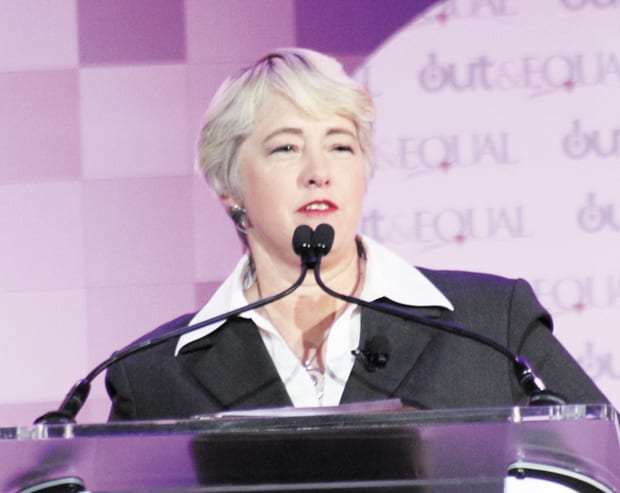‘Use our differences to make a difference,’ Houston mayor tells Out & Equal attendees
DAVID TAFFET | Senior Staff Writer
Will Houston Mayor Annise Parker be running for governor of Texas in 2018?
“Maybe,” Parker replied when asked, during an impromptu interview following her speech at the Out & Equal Conference this week, about a possible gubernatorial campaign.
Parker’s term as mayor ends in January, the same month that Greg Abbott will be finishing his first year as governor. That gives Parker plenty of time to decide whether to mount a challenge for the office two years down the road.
Until now, when asked if she would run for higher office, Parker has told reporters she loved being mayor of Houston and was concentrating on her job through the end of her term. In 2014, she declined to be considered for any statewide position, even though she would have been a popular choice among Democrats had she entered a primary.
But with the end of her final term as mayor looming ever larger, Parker offered one major caveat about her plans for the future: “I gotta have a job.”
And while she has no immediate plans for post mayoral employment, any run for higher office will be contingent on what her future job might be.
Houston allows a person to run for three two-year terms for city offices. Parker spent six years as an at-large city councilwoman, six years as city comptroller — an elected office in Houston — and is finishing her sixth year as mayor.
Speaking to the some 3,000 people attending the Out & Equal conference this week, Parker recalled that in coverage of her first win as mayor in the international media — including a story in the Times of India that mostly quoted from Dallas Voice — the tone was, “Really? Houston?”
Parker went on to tell those attending the event dedicated to diversity that as mayor of the most diverse major city in the U.S., she quickly discovered that it isn’t enough to have a diverse workforce.
“It’s what you do with the diversity” that counts.
“Have a real dialogue and input and exchange,” she insisted.
Comparing diversity to a garden, Parker said either a variety of plants can compete for attention and space, creating chaos, or every plant can be given room to grow, thus creating a beautiful display.
Parker pointed to M.D. Anderson, Houston’s world-renown cancer hospital, as an example of how to celebrate a diverse workforce. Thousands of people make up the hospital’s workforce, each with different skills and talents and experiences to contribute. But they are all contributing to a shared mission. When asked what they do, everyone from doctors and nurses to maintenance staff has the same answer: “I help cure cancer.”
“Be our true authentic selves whenever possible,” Parker urged. “Use our differences to make a difference.”
Citing her frustration at having to defend the Houston Equal Rights Ordinance at the ballot box in November and facing the same opponents who’ve opposed her for decades, Parker said the election to reinstate the city’s nondiscrimination ordinance “is what it is.”
She seemed confident Houston voters would pass the ordinance and noted the group opposing it didn’t live in her city.
Finally, Parker embraced the idea of the “Gay Agenda” that she said her opponents have been accusing her of pushing since she entered politics:
We want to go to school in safety, without being bullied.
We want to serve our country openly and proudly.
We want to work at jobs we love and pay taxes.
We want to protect our relationships and families we love and that nurture us.
As she was being escorted by police through the kitchen and out of a rear entrance of the hotel to head back to Houson, Parker spoke briefly with Dallas Voice, taking a few minutes to talk about her future plans and her legacy as mayor. She said she’ll be remembered for her homelessness initiative and as the infrastructure mayor, and for “raising the money to pay for the infrastructure.”
Under her administration, Houston has expanded its parks system and worked on roads throughout the city. South Houston, being on a low coastal plain, will always have a flooding problem, she said.
In her last months in office, she said a major job is defending HERO.
But Parker will also be remembered for never trying to hide her identity. From the beginning of her political career she was open and honest about who she was. Anyone who wanted to know anything about her activism in the LGBT community could find it clearly written in her resume. That included her experience as president of the Houston GLBT Political Caucus. Her wife and children were also listed.
This article appeared in the Dallas Voice print edition October 9, 2015.


